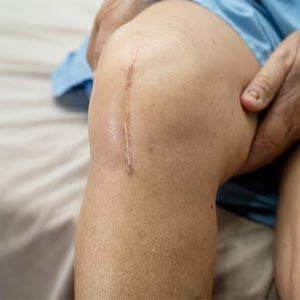
Knee joint replacement surgery in vijayawada also known as knee arthroplasty or total knee replacement is a surgical procedure for resurfacing the damaged part of the knee joint which is therefore causing pain and disability. The main cause for a knee replacement surgery is usually osteoarthritis, which causes wear and tear of the cartilage, mostly seen in older adults or aged patients. The other causes of knee joint damage could be rheumatoid arthritis or trauma related damage.
The knee joint replacement procedure is performed under anesthesia and the incisions are kept to a bare minimum length, thereby decreasing the risk of infection and bleeding. At Trust joint center, expert team is available round the clock to ensure proper recovery and physiotherapy.
Severe pain and stiffness are the main symptoms of a knee, hip or shoulder that should be replaced or repaired. At the point when daily activities like walking, climbing steps, lifting or dressing become too difficult because of pain, your doctor might recommend replacement surgery. One of the most common causes for a joint replacement is osteoarthritis.
Osteoarthritis is a disease that damages the cartilage that assists joints move smoothly. When that cartilage breaks down, the bones in the joint start to rub against one another. This can lead to pain and stiffness.
The 3 main criteria which causes intense discomfort to patients and therefore opt for joint replacement are:
The complete procedure is conducted under general anesthesia. During the surgical procedure, the joint pain specialist in Vijayawada removes the damaged bone and cartilage from the joint and replaces it with artificial prosthesis made of metal, plastic or ceramic.
Joint replacement surgery involves two methods. One is the traditional procedure where a few inches long incision is made to perform the removal procedure. The second one is the minimally invasive technique where the surgical cut is smaller in size. The latter one is preferred by most surgeons to reduce blood loss and post-operative pain.
Gone are the days when joint replacement meant months of bed rest and recovery period. With medical advancements, the procedure itself has been simplified to a great extent and thereby decreasing the recovery time exponentially. Patients can start walking with help of supporting equipment within one day of the surgery. Durability of the joints have also improved, with right care, a replaced joint can last for more than two decades.
After the surgery, your leg will feel stiff. You might experience some pain. Getting pain killers through your vein, or intravenously, can assist with managing this pain. You might receive long-acting local sedatives at the time of surgery or potentially a nerve block to assist with postoperative pain. You will receive medications to prevent your blood from clotting.
Many people start with physical therapy the day of surgery or day after their surgery to elevate blood flow to the tissues around the new knee. Your surgeon might recommend utilizing a passive-motion machine. This is a special brace-like device that constantly moves your knee in a gentle bending movement.
Your surgeon at best joint replacement hospitals in Vijayawada will let you know when is the right time to leave the hospital. This is based upon the results of the surgery and your condition.
Following the surgery, you will go through physical therapy. The knee joint replacement doctor in Vijayawada and physical therapy team will design a program that is ideal for you.
People who have undergone total knee replacement, the new joint must last about 20 years, and it might well last longer.
If you’ve had a partial knee replacement, you are more likely to require a recurrent operation – around 1 person in 10 needs further surgery after 10 years.
The possibilities requiring another operation is greater if you’re overweight and involved in heavy manual work.